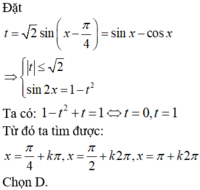Giải phương trình sin 2 x + 2 sin x - π 4 = 1
![]()

![]()
![]()
Hãy nhập câu hỏi của bạn vào đây, nếu là tài khoản VIP, bạn sẽ được ưu tiên trả lời.



\(sin^2x-2m.sinx.cosx-sinx.cosx+2mcos^2x=0\)
\(\Leftrightarrow sinx\left(sinx-cosx\right)-2mcosx\left(sinx-cosx\right)=0\)
\(\Leftrightarrow\left(sinx-cosx\right)\left(sinx-2m.cosx\right)=0\)
\(\Rightarrow\left[{}\begin{matrix}sinx=cosx\\sinx=2m.cosx\end{matrix}\right.\)
\(\Rightarrow\left[{}\begin{matrix}tanx=1\\tanx=2m\end{matrix}\right.\)
Do \(tanx=1\) ko có nghiệm đã cho nên \(tanx=2m\) phải có nghiệm trên khoảng đã cho
\(\Rightarrow tan\left(\dfrac{\pi}{4}\right)< 2m< tan\left(\dfrac{\pi}{3}\right)\)
\(\Rightarrow1< 2m< \sqrt[]{3}\)
\(\Rightarrow m\in\left(\dfrac{1}{2};\dfrac{\sqrt{3}}{2}\right)\) (hoặc có thể 1 đáp án là tập con của tập này cũng được)

1.
\(\Leftrightarrow\dfrac{1}{2}-\dfrac{1}{2}cos4x=\dfrac{1}{2}+\dfrac{1}{2}cos\left(2x-\dfrac{\pi}{2}\right)\)
\(\Leftrightarrow-cos4x=cos\left(2x-\dfrac{\pi}{2}\right)\)
\(\Leftrightarrow cos\left(4x-\pi\right)=cos\left(2x-\dfrac{\pi}{2}\right)\)
\(\Leftrightarrow\left[{}\begin{matrix}4x-\pi=2x-\dfrac{\pi}{2}+k2\pi\\4x-\pi=\dfrac{\pi}{2}-2x+k2\pi\end{matrix}\right.\)
\(\Leftrightarrow\left[{}\begin{matrix}x=\dfrac{\pi}{4}+k\pi\\x=\dfrac{\pi}{4}+\dfrac{k\pi}{3}\end{matrix}\right.\)
\(\Leftrightarrow x=\dfrac{\pi}{4}+\dfrac{k\pi}{3}\)
2.
\(\Leftrightarrow1-cos^2x+1-sin^24x=2\)
\(\Leftrightarrow cos^2x+sin^24x=0\)
\(\Leftrightarrow\left\{{}\begin{matrix}cosx=0\\sin4x=0\end{matrix}\right.\)
\(\Leftrightarrow cosx=0\)
\(\Leftrightarrow x=\dfrac{\pi}{2}+k\pi\)

Với \(cosx=0\) ko phải nghiệm
Với \(cosx\ne0\) chia 2 vế cho \(cos^2x\)
\(\Rightarrow tan^2x-4\sqrt{3}tanx+1=-2\left(1+tan^2x\right)\)
\(\Leftrightarrow3tan^2x-4\sqrt{3}tanx+3=0\)
\(\Rightarrow\left[{}\begin{matrix}tanx=\sqrt{3}\\tanx=\dfrac{\sqrt{3}}{3}\end{matrix}\right.\)
\(\Rightarrow\left[{}\begin{matrix}x=\dfrac{\pi}{3}+k\pi\\x=\dfrac{\pi}{6}+k\pi\end{matrix}\right.\)

Lời giải:
$\sin (2x+1)=\frac{-1}{2}$
$\Rightarrow 2x+1=\frac{-\pi}{6}+2k\pi$ hoặc $2x+1=\frac{7}{6}\pi +2k\pi$ với $k$ nguyên
Với $2x+1=\frac{-\pi}{6}+2k\pi$
Do $x\in (0;\pi)$ nên $k=1$
$x=\frac{11}{12}\pi -\frac{1}{2}$
Với $2x+1=\frac{7\pi}{6}+2k\pi$
Do $x\in (0;\pi)$ nên $k=0$
$\Rightarrow x=\frac{7}{12}\pi -\frac{1}{2}$

\(\left(2cosx+\sqrt{3}\right)\left(cos2x+2sinx-\sqrt{3}\right)=1-4\left(1-cos^2x\right)\)
\(\Leftrightarrow\left(2cosx+\sqrt{3}\right)\left(cos2x+2sinx-\sqrt{3}\right)=4cos^2x-3\)
\(\Leftrightarrow\left(2cosx+\sqrt{3}\right)\left(cos2x+2sinx-\sqrt{3}\right)=\left(2cosx+\sqrt{3}\right)\left(2cosx-\sqrt{3}\right)\)
\(\Leftrightarrow\left[{}\begin{matrix}cosx=-\dfrac{\sqrt{3}}{2}\Rightarrow x=...\\cos2x+2sinx-\sqrt{3}=2cosx-\sqrt{3}\left(1\right)\end{matrix}\right.\)
\(\left(1\right)\Leftrightarrow cos^2x-sin^2x-2\left(cosx-sinx\right)=0\)
\(\Leftrightarrow\left(cosx-sinx\right)\left(cosx+sinx\right)-2\left(cosx-sinx\right)=0\)
\(\Leftrightarrow\left(cosx-sinx\right)\left(cosx+sinx-2\right)=0\)
\(\Leftrightarrow...\)